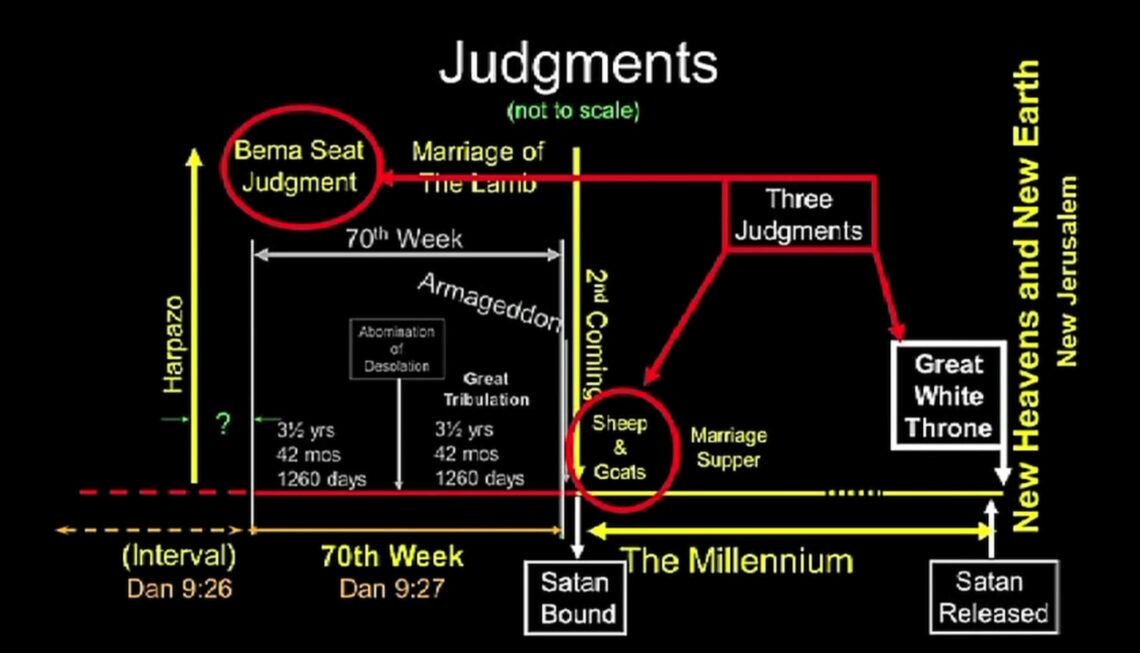[This article is based on the teaching of Arnold Fruchtenbaum. 한글은 여기 있습니다. ]
- God’s plan for Israel involves Jesus’ second coming at the end of the 7-year Tribulation period.
- God’s plan for the Church involves the rapture of believers (Jesus’ return in the air) before the outpouring of God’s wrath.
The teaching on the rapture can first be found in John 14. After finishing the Last Supper, Jesus tells His disciples, “Do not let your hearts be troubled… I go to prepare a place for you. And if I go and prepare a place for you, I will come again and receive you to Myself, that where I am, there you may be also.” This “I will come again and receive you to Myself” refers to the rapture. In this event, Jesus comes specially to take His church saints to where He is, which is heaven.
The second biblical basis for the rapture is found in 1 Thessalonians 4. Paul founded the church in Thessalonica and had three weeks to teach basic Christian doctrines, including the rapture. However, he didn’t have time to explain everything, like what happens to believers who die before the rapture. Paul answers this in his first letter, explaining that not only will deceased believers participate in the rapture, but they will be resurrected before the living believers are caught up. Let’s list the seven stages of the rapture event from verses 13-18:
- The Lord Jesus Himself will descend from heaven.
- The Lord will give a shout (a military term for a commanding officer issuing orders).
- The archangel will call out (repeating the command).
- The trumpet of God will sound (signalling the order to be carried out.)
- The dead in Christ will rise first (believers who have received the baptism of the Holy Spirit become “church saints’; according to Daniel 12:2, Old Testament saints will be resurrected after the Tribulation).
- “We who are alive and remain will be caught up together with them in the clouds.” Here, Paul includes himself when he says “we”, because he believed he might still be alive when Jesus returns, showing the Doctrine of Imminence—since the early church, we’ve been living in the “last days,” meaning the rapture event can happen at anytime.
- “We will meet the Lord in the air, and so we will always be with the Lord.” The church, meeting Jesus in the air in glory, goes to heaven as promised in John 14.
Doubting the rapture because the word “rapture” doesn’t appear in the Bible is like doubting the Trinity because the word “Trinity” doesn’t appear in the Bible. The Greek word for rapture, “harpazo”, means “to be caught up.” It is nothing more and nothing less.
The third scriptural passage on the rapture is 1 Corinthians 15:50-58:
“Now this I say, brethren, that flesh and blood cannot inherit the kingdom of God; nor does the perishable inherit the imperishable.”
1 Corinthians 15:50
Our current physical bodies will be transformed into resurrection bodies before we go to inherit God’s kingdom, and this transformation happens at the rapture. Paul calls this a “mystery”:
“Behold, I tell you a mystery: we will not all sleep, but we will all be changed, in a moment, in the twinkling of an eye, at the last trumpet.”
1 Corinthians 15:51-52
Here, “mystery” means a truth that was hidden in the Old Testament but finally revealed in the New Testament. See how Paul defines “mystery” in Ephesians 3:5:
“…which in other generations was not made known to the sons of men, as it has now been revealed to His holy apostles and prophets in the Spirit.”
Ephesians 3:5
Paul again defines “mystery” in this way in Colossians 1:26:
“…the mystery which has been hidden from the past ages and generations, but has now been manifested to His saints.”
Colossians 1:26
Paul mentions in 1 Corinthians 15 that the rapture is one of these revealed mysteries.
The second coming of the Messiah and the millennial kingdom are not mysteries because they were already revealed to and understood by the prophets in the Old Testament.
“Behold, I tell you a mystery: we will not all sleep, but we will all be changed.”
1 Corinthians 15:51
Paul uses “sleep” to describe the death of believers, indicating that while their physical activities stop temporarily, their souls remain alive and active in the presence of God.
In verses 51-52, Paul references the fourth (God’s trumpet), fifth (resurrection of dead church saints), and sixth (rapture of living church saints) stages of the rapture as listed above. During this sixth stage, we are caught up and instantly transformed into resurrection bodies.
Some believers in a post-tribulation rapture equate the “last trumpet” in this passage to one of the seven trumpet judgments in Revelation 16-18, but this is incorrect. The Corinthians didn’t have the Book of Revelation (written about 30 years later), but instead they understood Paul’s reference to the “last trumpet” because he had taught them about the seven Jewish festivals. Throughout 1 Corinthians, Paul mentions the other festivals, expecting his readers to get the references without need for explanations:
- Passover: Fulfilled by the Messiah’s death (1 Cor. 5:6-7)
- Unleavened Bread: Fulfilled by the Messiah’s shedding of blood (1 Cor. 5:8)
- First Fruits: Fulfilled by the Messiah’s resurrection (1 Cor. 15:20-23)
- Pentecost/Weeks: Fulfilled by the Church’s beginning (Acts 2, 1 Cor. 11-14)
The three fall festivals (yet to be fulfilled) are:
- Trumpets: Fulfilled by the rapture (1 Cor. 15:52)
- Day of Atonement: Fulfilled by Israel’s national repentance and restoration at the end of the Tribulation
- Tabernacles: Fulfilled by the Messiah’s millennial kingdom
We live between the festivals of Pentecost and Trumpets. In Jewish customs even today, the shofar is first blown 99 times on the festival day of Trumpets, with the 100th long blast called the “last trumpet.” Jewish tradition equates this “last trumpet” with the bodily resurrection of all jewish believers. It is this resurrection motif that Paul picks up when he is writing about the rapture.
Regarding the church during the Tribulation period as described in Revelation, it is interesting that there are no mentions the ecclesia in all descriptions of the Tribulation period (Revelation 4-19); ecclesia is found only before (Revelation 1-3) and after (Revelation 19).
Here, I believe a clarification is in order: Some people equate the Tribulation (or even the Great Tribulation) with the full seven-year period. I disagree. I believe the first years of the seven-years are “birthing pains” (The First Six of the Seven Seals of Revelation 6), and that we should be calling the last few months/years of God’s wrath the Great Tribulation: specifically, the periods of Seven Trumpets and Seven Bowls.
For the great day of His wrath has come, and who is able to stand?
Revelation 6:17
Next, let’s look at Luke 21. Starting from verse 25, Jesus describes events during the Great Tribulation. In verse 35, He says:
“It will come upon all those who dwell on the face of all the earth.”
Luke 21:35
The Great Tribulation is unavoidable for those on earth. But in verse 36, Jesus says:
“Keep alert at all times, praying that you may have strength to escape all these things that are about to take place, and to stand before the Son of Man.”
Luke 21:36
Since Jesus just said the Great Tribulation is unavoidable on earth, this must refer to escaping via the rapture to stand before Him in heaven, where the Bema Seat of Christ judgment (1 Cor. 3:13-15) will occur.
In 1 Thessalonians 1:
“For they themselves report about us what kind of a reception we had with you, and how you turned to God from idols to serve a living and true God, and to wait for His Son from heaven, whom He raised from the dead, that is Jesus, who rescues us from the wrath to come.”
1 Thessalonians 1:5
Here, “wrath to come” refers to the Great Tribulation.
In 1 Thessalonians 5:
“Now as to the times and the epochs, brethren, you have no need of anything to be written to you. For you yourselves know full well that the day of the Lord will come just like a thief in the night.” (verses 1-2)
1 Thessalonians 5:1-2
Paul transitions from the rapture (chapter 4) to the Day of the Lord (the Great Tribulation), which will come unexpectedly for unbelievers. In verse 9, he says:
“For God has not destined us for wrath, but for obtaining salvation through our Lord Jesus Christ.”
1 Thessalonians 5:9
The “wrath” refers to the Great Tribulation, which Paul explained we will escape via the rapture.
In Revelation 3, Jesus promises the Philadelphia church:
“Because you have kept My command to persevere, I also will keep you from the hour of trial which shall come upon the whole world, to test those who dwell on the earth.”
Revelation 3:10
This promise means the Church will be kept from the Great Tribulation, not merely preserved through it. If it meant the latter, it would contradict the deaths of believers depicted in Revelation 6-18.
In Revelation 19, the first 10 verses describe events in heaven before Jesus’ Second Coming in verses 11-21. The marriage of the Lamb (verses 6-7) involves the raptured church, clothed in “fine linen, bright and clean,” symbolising righteous acts validated at the Bema Seat of Christ.
In conclusion, since the early Church, we have lived in the “last days,” and the rapture can happen at any moment. Our “blessed hope” is not watching for the Antichrist or worrying about the Great Tribulation but looking forward to “meeting the Lord in the air” and being with Him forever.
“Maranatha! Amen. Come, Lord Jesus!”




